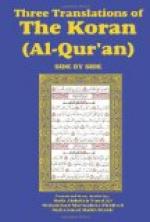75 Such appears to have been the superstitious custom of the Arabs after their return from pilgrimages to Mecca.
76 Their driving you out of Mecca; or, the temptation (to idolatry).
77 Lit. the sacred month for the sacred month, and the sacred precincts or things (for) reprisals. The meaning of this difficult passage is that in wars for the cause of religion, the sacred month and the temple of Mecca may be made the time and scene of contests, which then and there are usually prohibited. For the most accurate information as to the Pilgrimage, see Freytag, Einl. 418.
78 This shows that Muhammad inculcated the doctrine of entire freedom of the will.
79 The greater Pilgrimage, which every Muslim is bound to perform once in his life, is the Hadjat el Farz (the one obligatory Pilgrimage), or the Hadjat el Islam. The Umrah, or little pilgrimage, may be performed at any time except the pilgrimage season, and its ceremonies are much fewer. They are described by Lieut. Burton in his “Pilgrimage,” vol. iii. ch. xxviii.
80 Namely, Shawâl, Dhu’lkaada, and Dhu’lhajja.
81 By trading during the Hadj.
82 The pilgrims move on very rapidly when in the immediate neighbourhood of the Holy Places.
83 From the valley of Mina.
84 Said to have been one Al Akhnas Ibn Shoraik, a dissembler with Muhammad.
85 Sohaib, when he joined the standard of Muhammad, left all his property in the hands of the infidels.
86 Verses 204-210 are probably addressed to those Muslims who were desirous to observe certain parts of the Jewish law.
87 The Koran.
88 That is, there was originally but one religion in the world.
89 Comp. Sura [c.] iv. 42, and [cxiv.] v. 99, 100.
90 Limits, fences. The word is Talmudic. Thus Pirke Aboth, i. “The men of the great synagogue said . . . Make a fence for the law;” and iii. 13, “Tradition is a fence to the law.”
91 Comp. Sura [lxxxii.] xxxi. 13.
92 Within the four months and ten days.
93 Either the asr, midway between noon and nightfall (see verse 104 above) or the prayer immediately after midday. See note on Sura [c.] iv. 46.
94 This verse is certainly older than the commencement of Sura iv. which alters the law here laid down.
95 Comp. Ezek. xxxvii. 1-10. These Jews are said by some commentators to have abandoned their dwellings through fear of a pestilence (comp. Talmud Sanhed. 92); by others, for fear of being compelled to serve in the wars of God.
96 This and the seven following verses shew that Muhammad, foreseeing an open rupture with the people of Medina at no distant period, felt it necessary to stimulate the zeal and courage of his partisans by examples from Jewish history.
97 Ar. Shechinah. See Freytag Lex. in v. This word, as well as the Arabic word for ark (p. 95, n.) betray in their form a Rabbinic origin.




